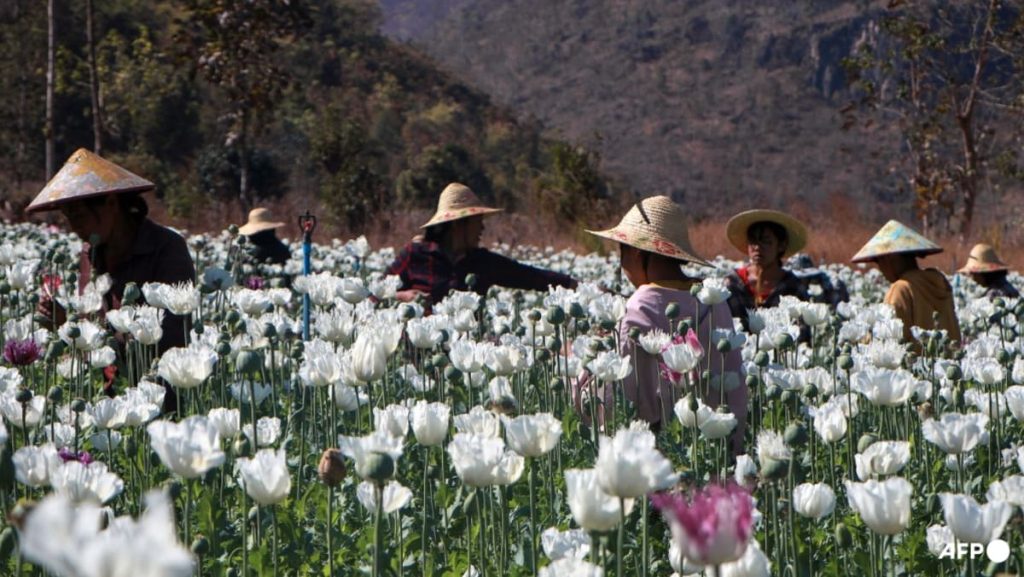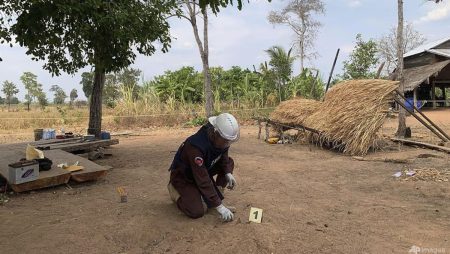The 2024 Myanmar Opium Survey, conducted by the United Nations Office on Drugs and Crime (UNODC), reveals a significant decline in opium poppy cultivation in Myanmar, marking the second consecutive year of decrease. The estimated area under poppy cultivation has fallen by 33% to 40,100 hectares in 2023, down from 59,200 hectares in 2022. This represents a substantial retreat from the peak cultivation levels observed in 2014, yet it still positions the 2023 harvest as the second largest in the past two decades, highlighting the persistent challenges in curbing opium production within the country. The report attributes this decline to a convergence of factors, including ongoing armed conflict, particularly in Shan state, a major opium-producing region, as well as logistical constraints imposed by the extreme monsoon season and limited access to remote growing areas. Furthermore, market dynamics, such as an oversupply of heroin in the regional market and shifts in the global drug supply chain, likely contributed to reduced demand for opiate exports and subsequent price drops, discouraging further cultivation.
The decline in opium production takes place against a backdrop of escalating conflict and economic hardship in Myanmar following the 2021 military coup. Shan state, which accounts for approximately 80% of the country’s opium production, has been embroiled in intense fighting, forcing many poppy farmers to abandon their fields. This displacement, coupled with the broader socio-economic turmoil triggered by the coup, has created a volatile environment ripe for exploitation by organized criminal groups involved in the drug trade. While the reduction in cultivation presents a glimmer of hope, the UNODC cautions against complacency. The underlying drivers of opium poppy cultivation, including poverty, lack of alternative livelihoods, and instability, remain pervasive, creating a fertile ground for a potential resurgence in production as market conditions shift.
The UNODC emphasizes the economic significance of opium cultivation in Myanmar, particularly in the context of the country’s faltering economy. The World Bank forecasts a 1% contraction in Myanmar’s economy for the fiscal year ending in March 2025, underscoring the economic fragility of the nation. In this context, opium production represents a significant source of income for many communities, especially in remote and conflict-affected areas where alternative livelihoods are scarce. The dependence on opium cultivation further complicates eradication efforts, as farmers struggle to find viable alternatives to sustain their livelihoods. This economic dependence, coupled with the ongoing conflict and instability, creates a complex and challenging environment for implementing effective drug control measures.
The report highlights the precarious balance between the decline in cultivation and the persistent risk of resurgence. Masood Karimpour, UNODC’s Regional Representative for Southeast Asia and the Pacific, emphasizes the potential for further expansion of opium poppy cultivation as supply chains adapt to market fluctuations and cultivation methods improve. This underscores the need for sustained efforts to address the underlying drivers of opium production, not just focusing on eradication but also on providing sustainable alternative livelihoods for farmers and fostering economic development in affected regions. The junta’s home affairs minister acknowledged the “severe challenges” faced by Myanmar authorities in curbing poppy cultivation, indicating the scale of the problem and the limitations of current strategies.
The UNODC’s findings underscore the complexity of the opium issue in Myanmar. The convergence of factors driving the decline in cultivation—from conflict and displacement to market dynamics and logistical constraints—presents both an opportunity and a challenge. While the decrease offers a respite, it also masks the underlying vulnerabilities that could lead to a resurgence in production. The fragile economic situation, exacerbated by the ongoing conflict and political instability, creates an environment where opium cultivation can easily rebound if market conditions become favorable or alternative livelihood options remain limited. The sheer scale of displacement caused by the conflict, with over three million people uprooted from their homes, further exacerbates the situation, creating a pool of vulnerable individuals susceptible to involvement in the drug trade.
Addressing the opium challenge in Myanmar requires a comprehensive and multi-faceted approach that goes beyond simply eradicating crops. It necessitates addressing the root causes of opium cultivation, including poverty, lack of alternative livelihoods, and the ongoing conflict. This involves not only investing in sustainable development programs and creating viable economic opportunities for farmers but also addressing the political and security challenges that fuel instability and displacement. The international community must play a crucial role in supporting these efforts, providing both financial and technical assistance to help Myanmar overcome these challenges and build a more resilient and sustainable future, free from the grip of the opium trade. The UNODC’s report serves as a stark reminder of the ongoing struggle and the urgent need for sustained and coordinated action to address this complex issue.










